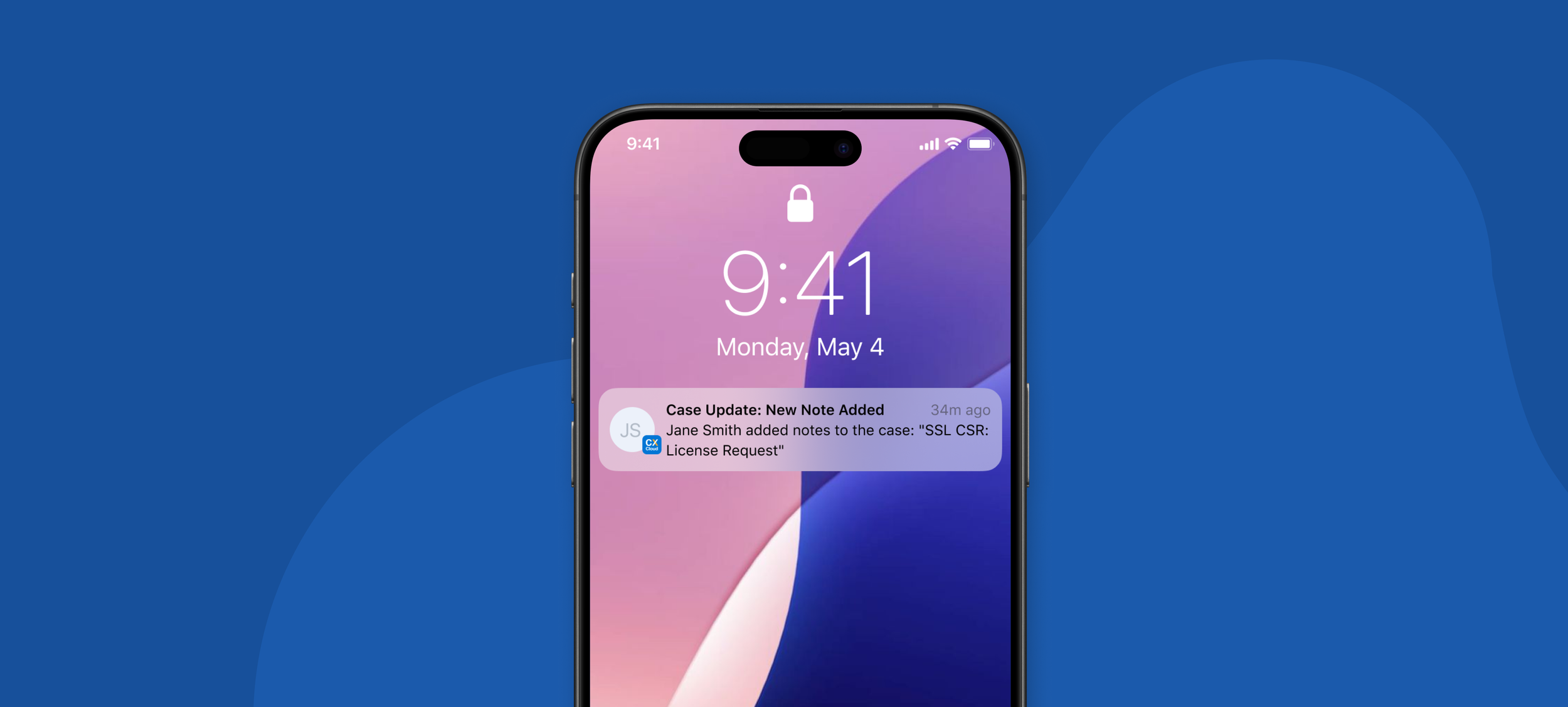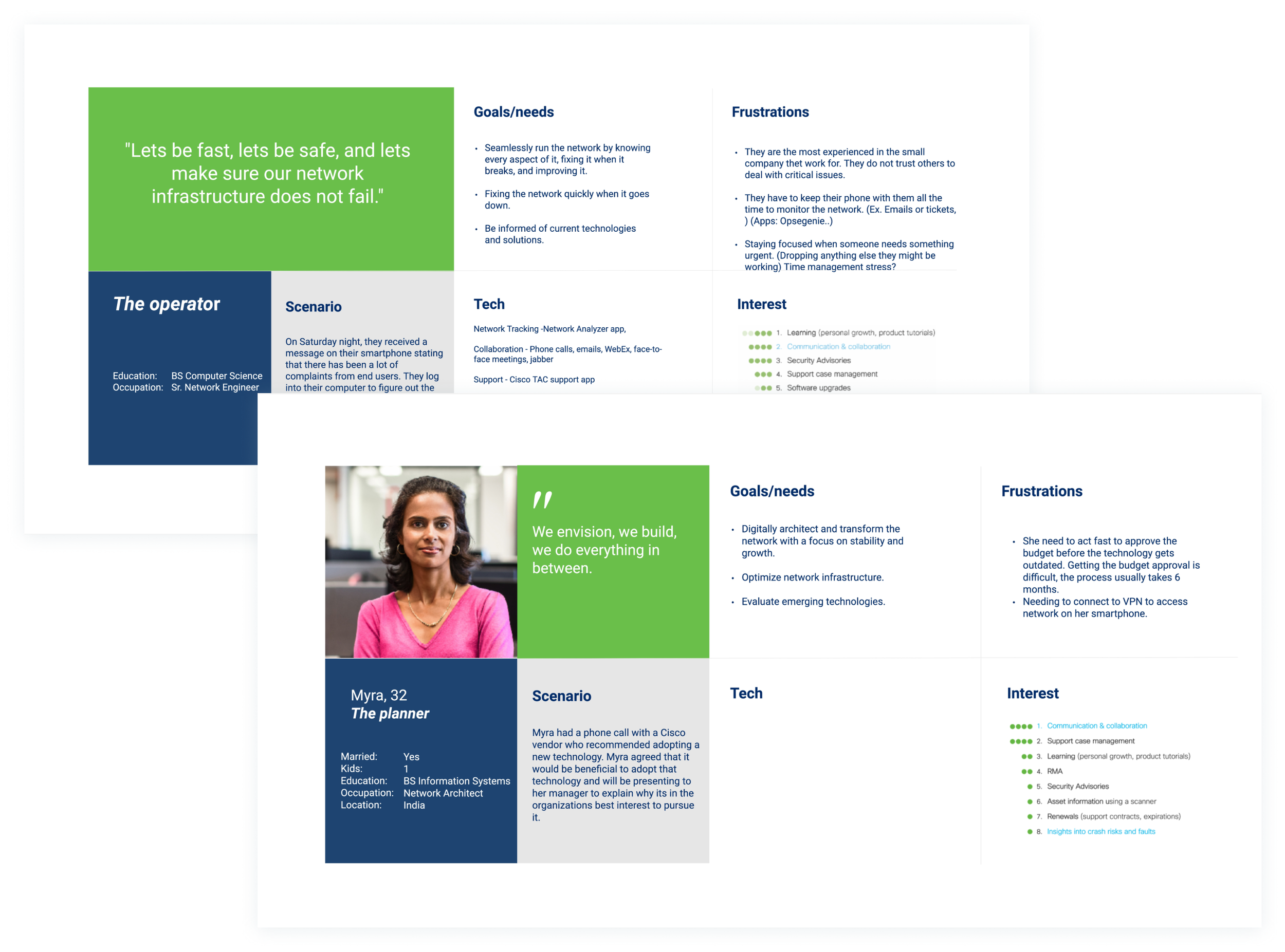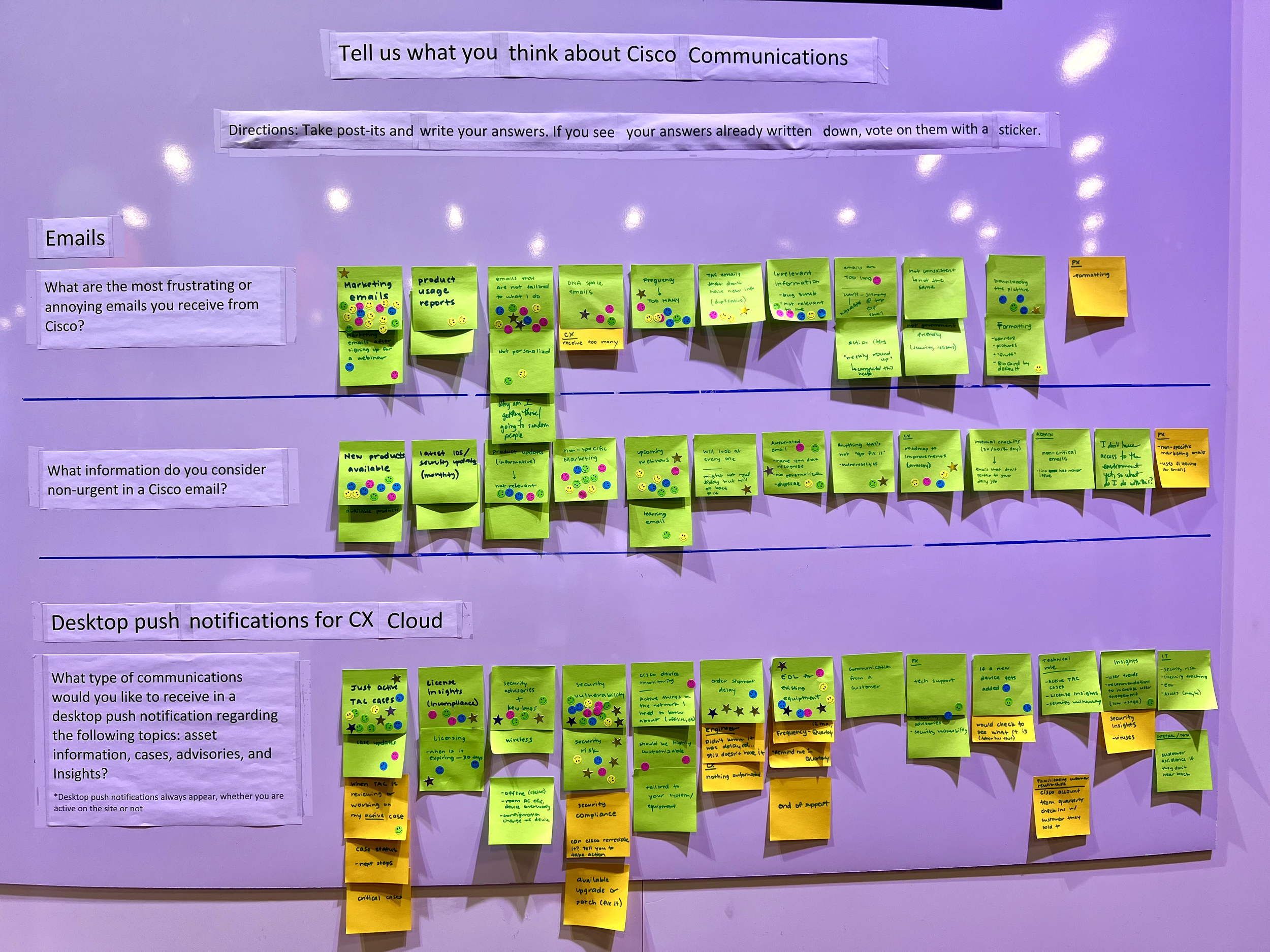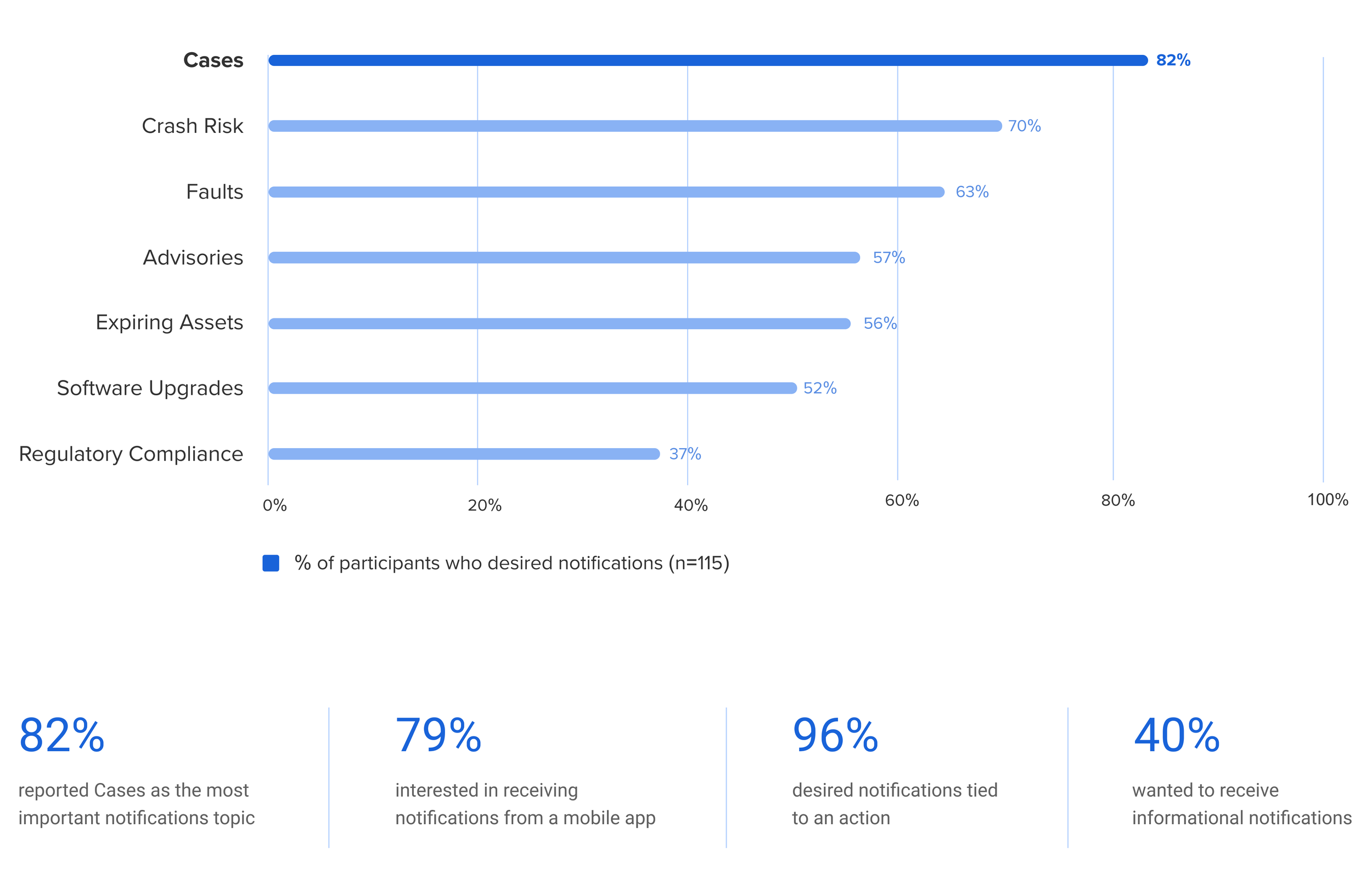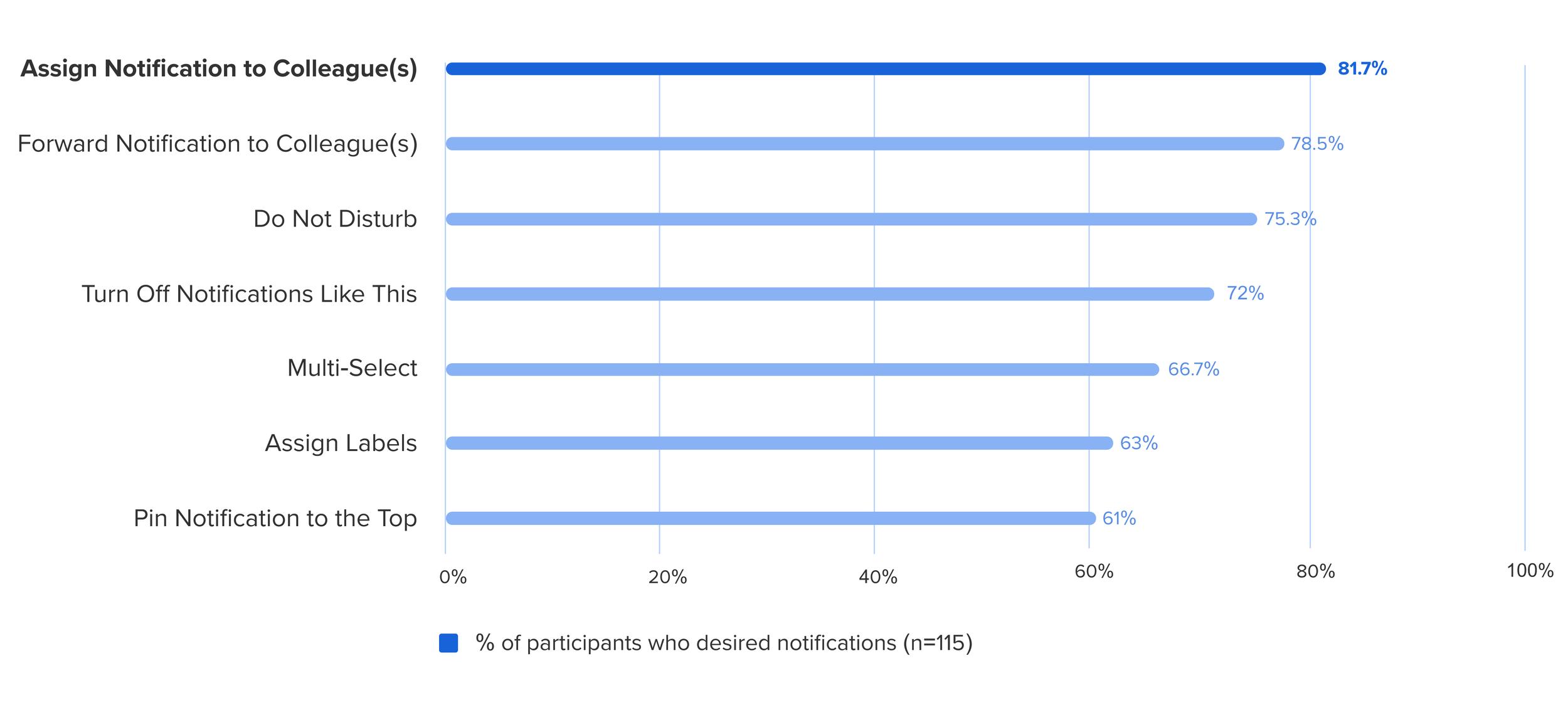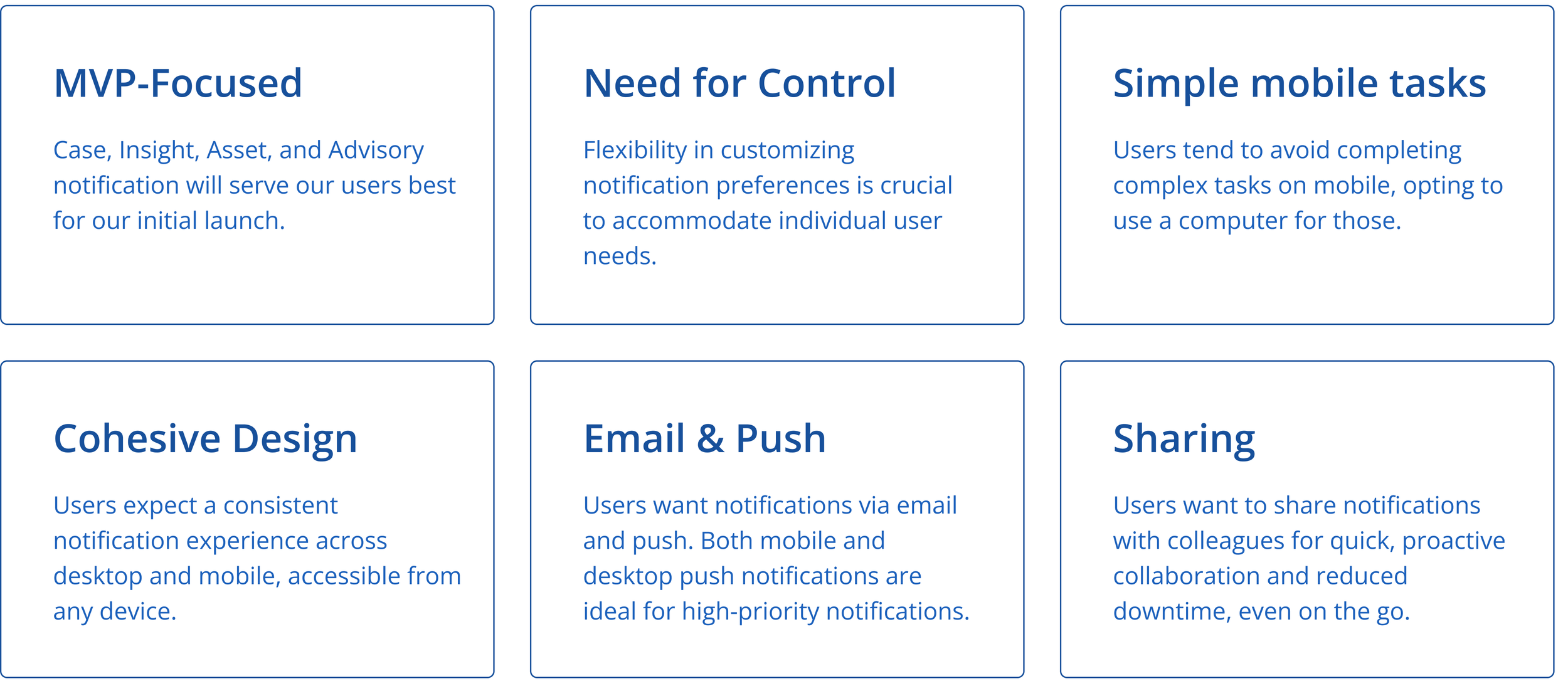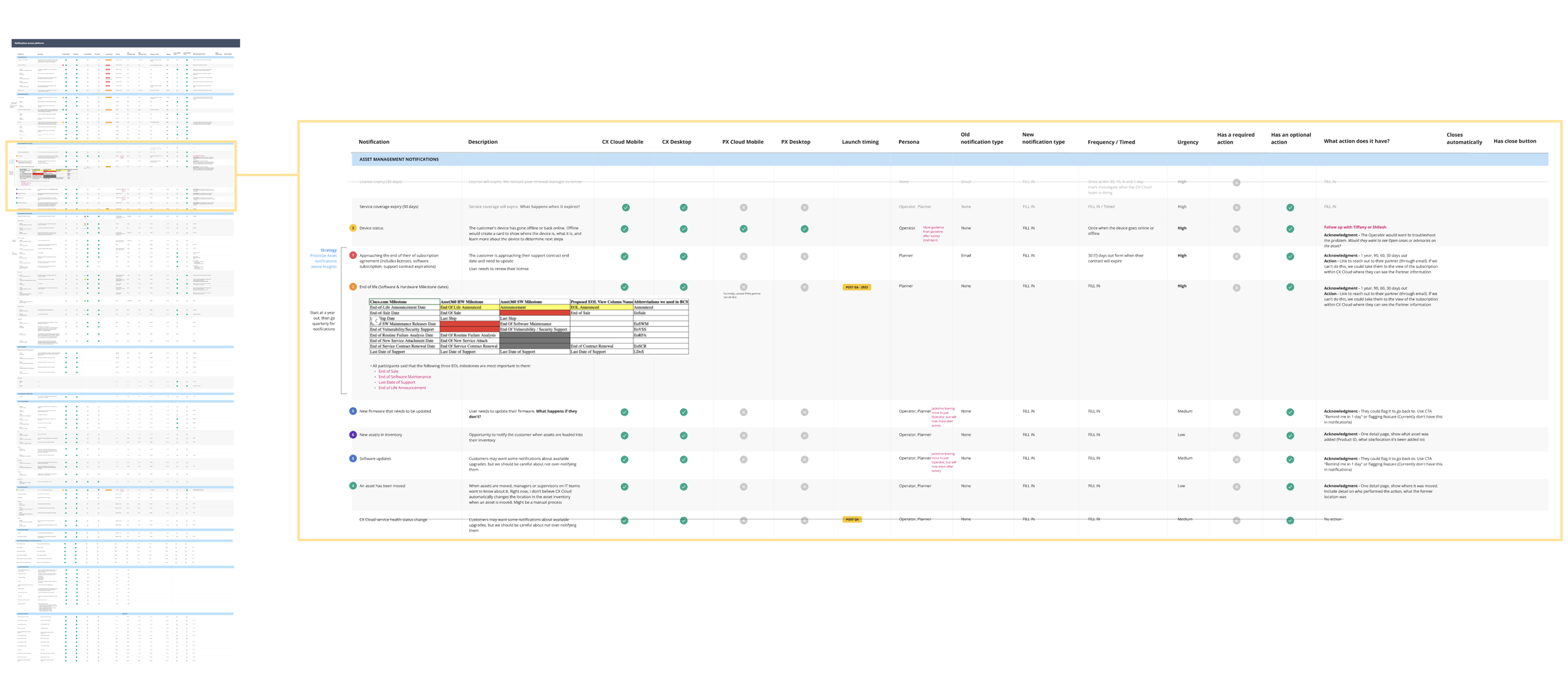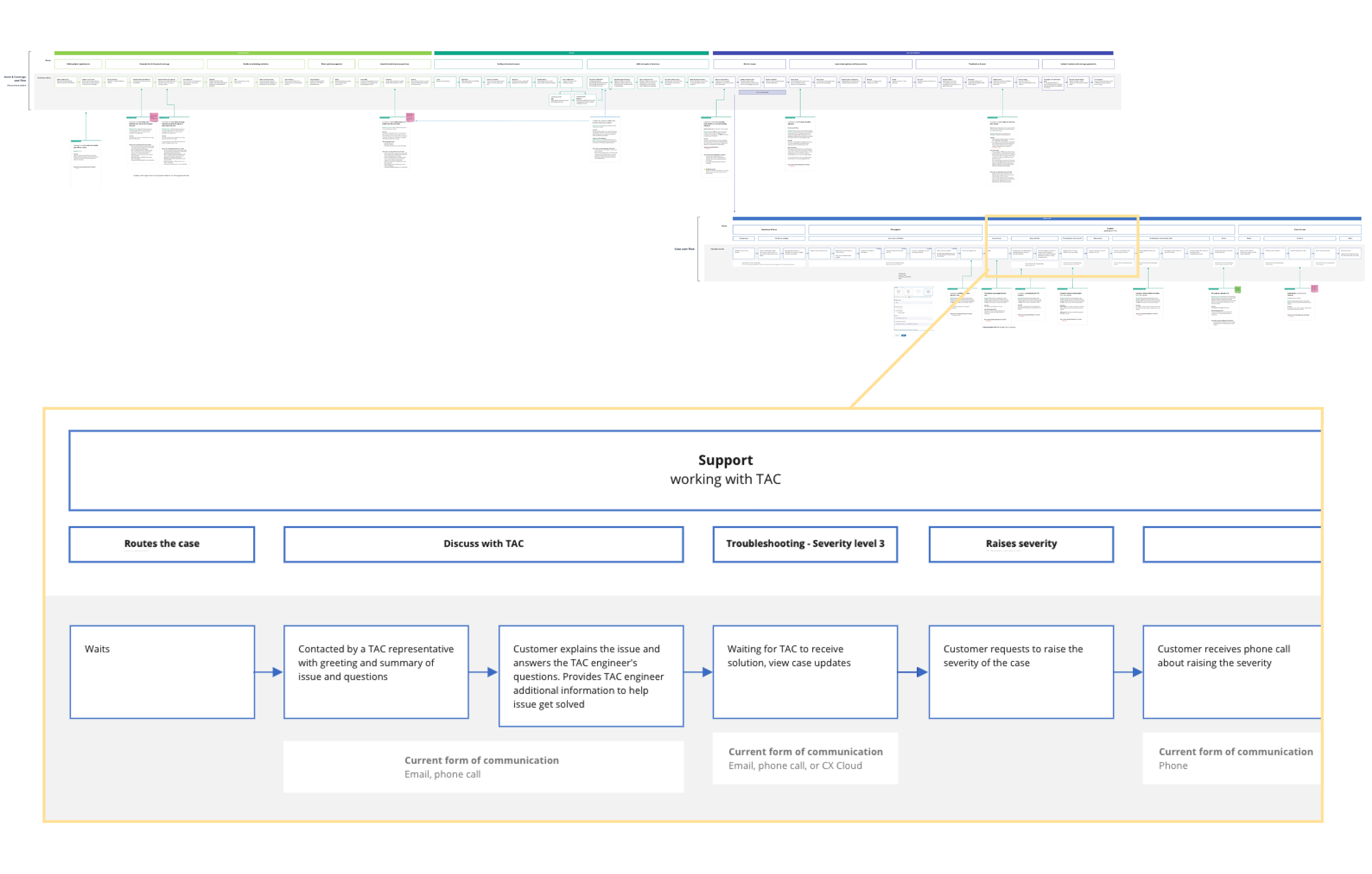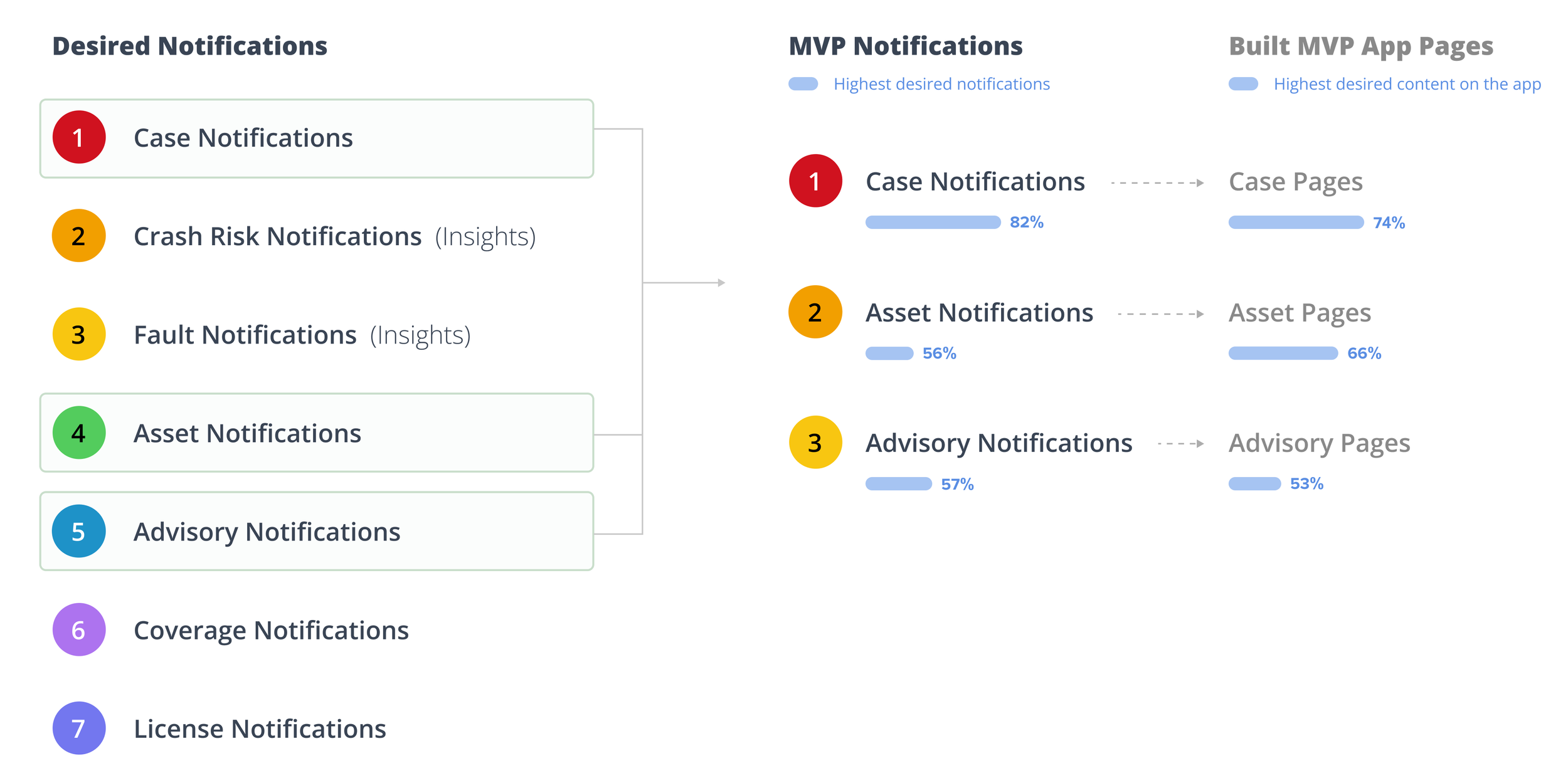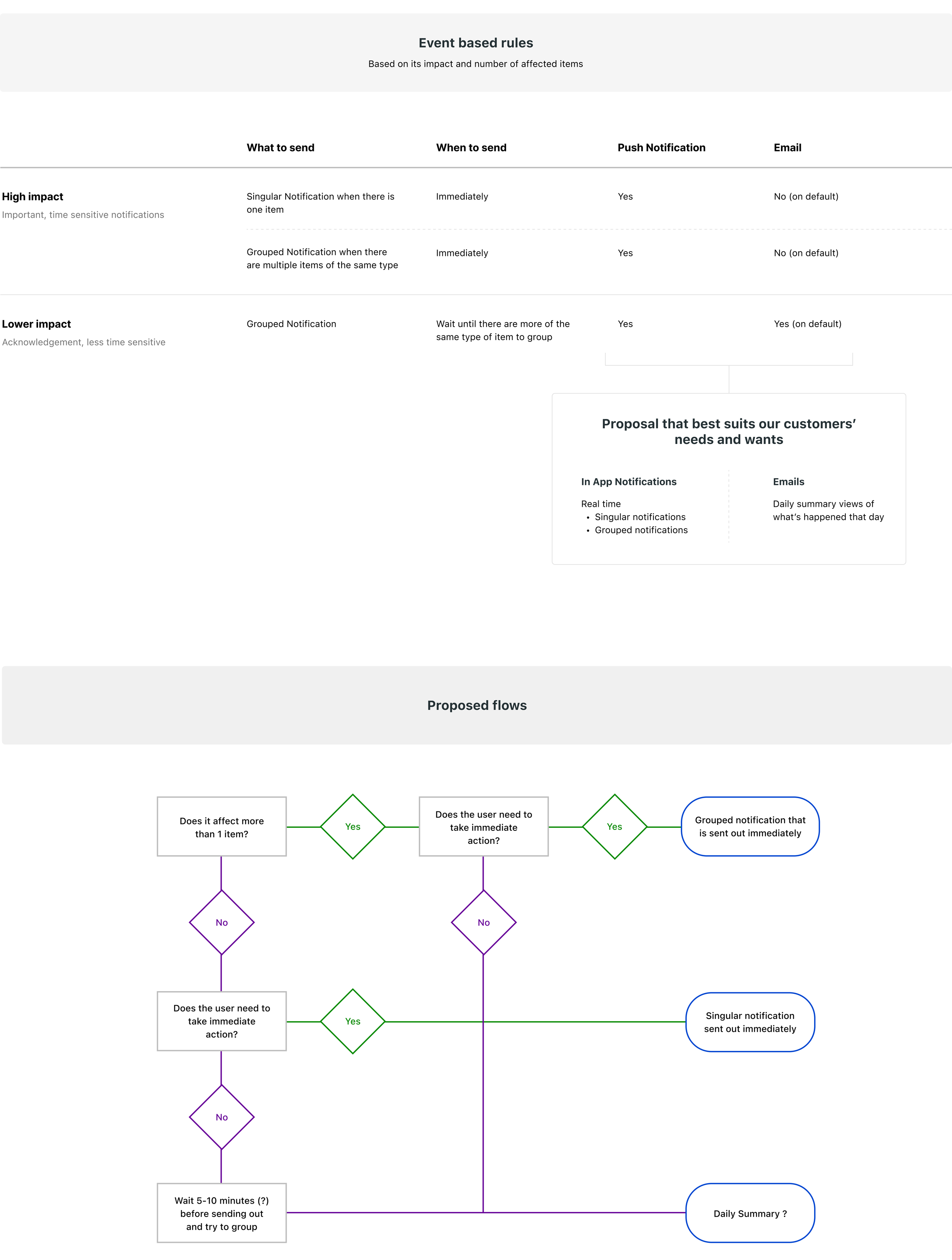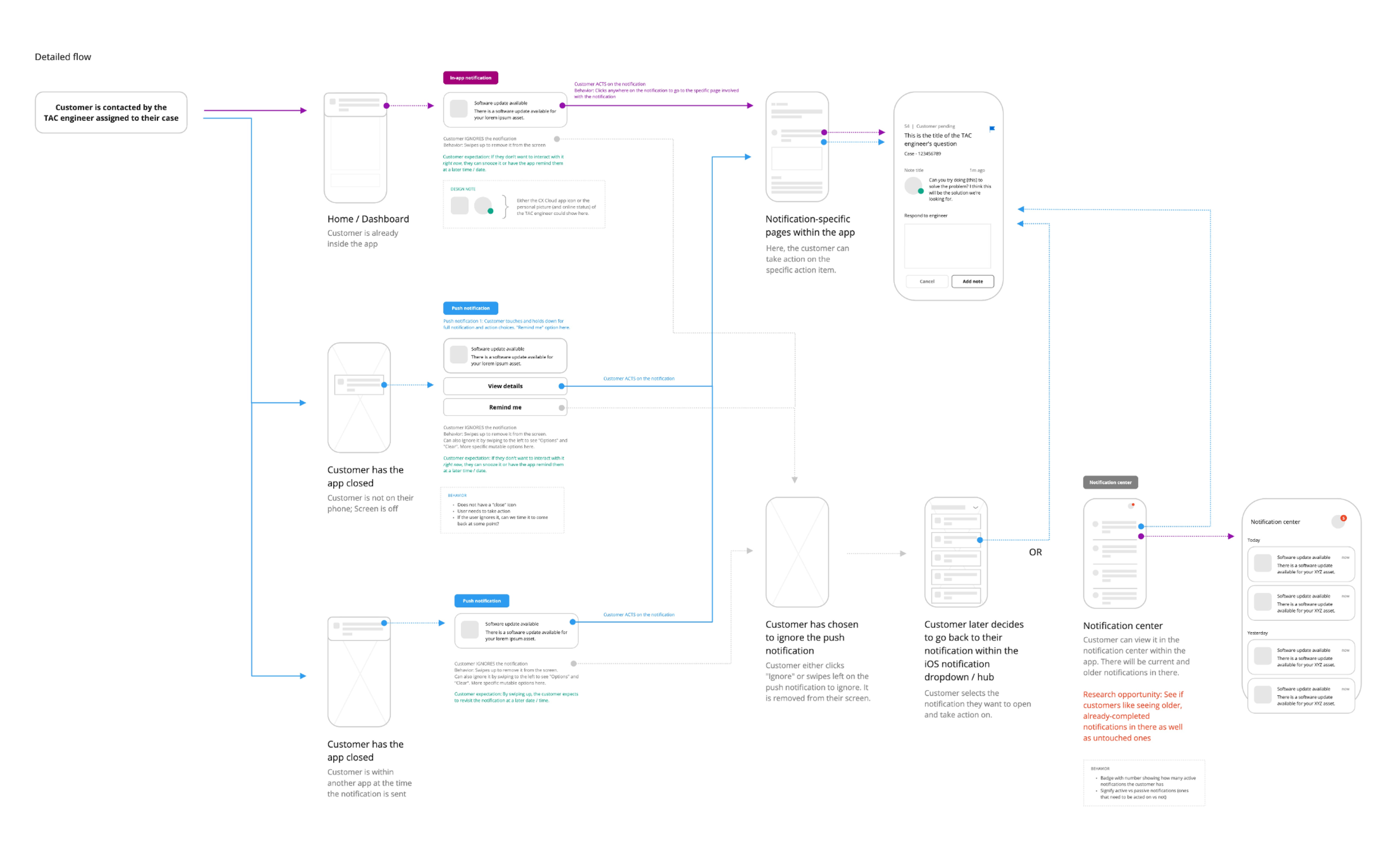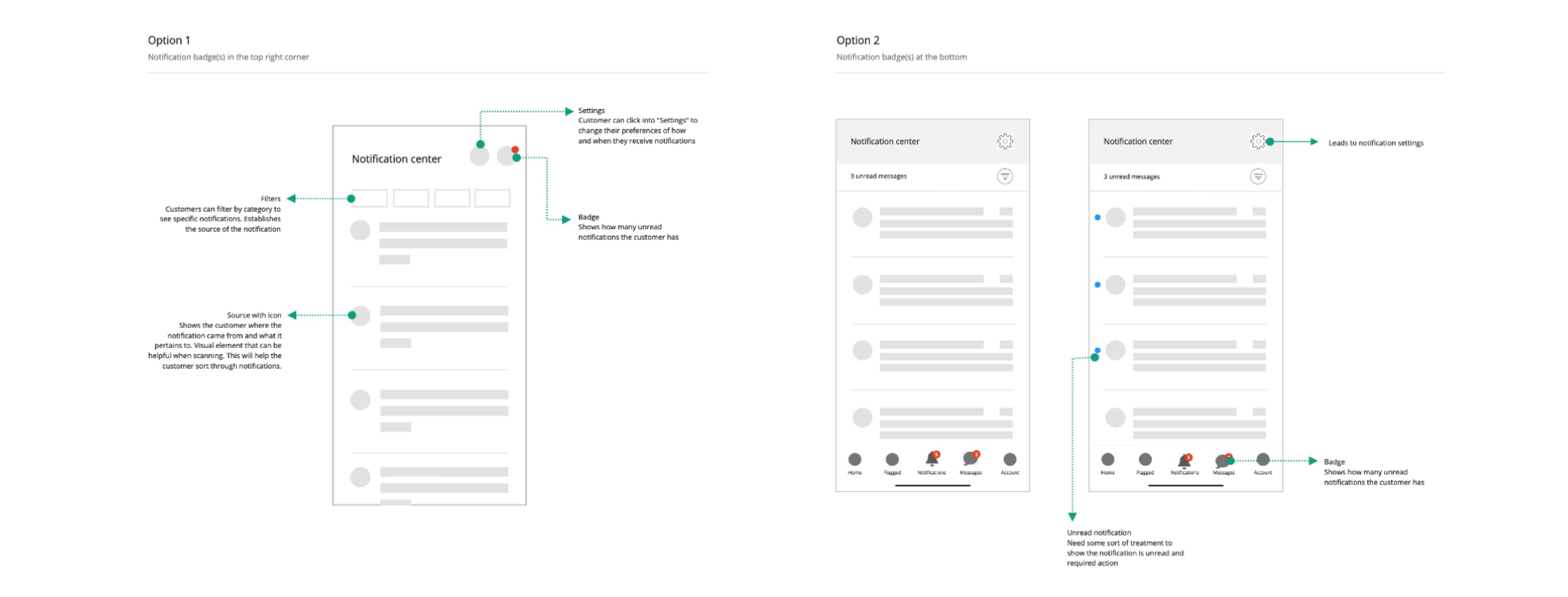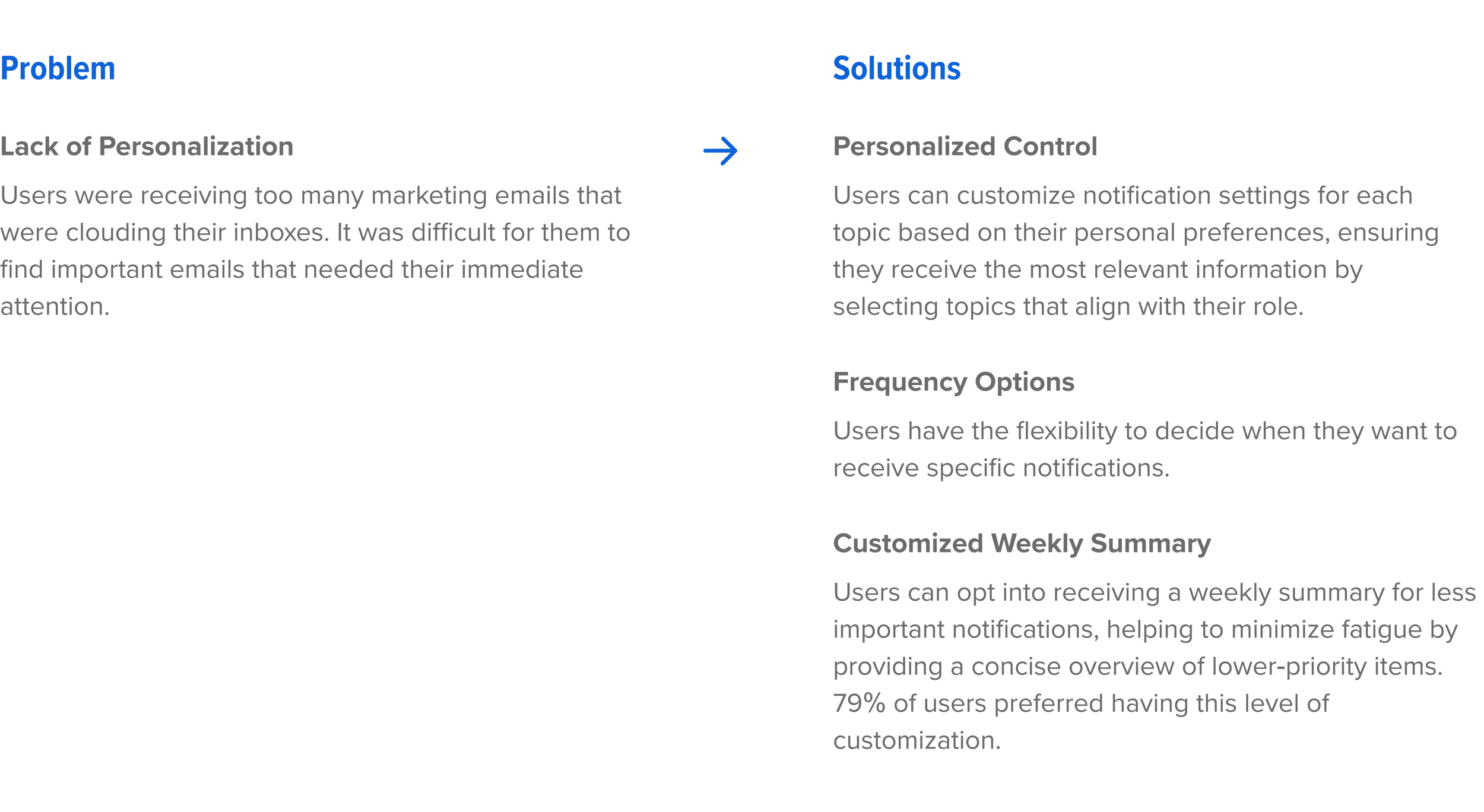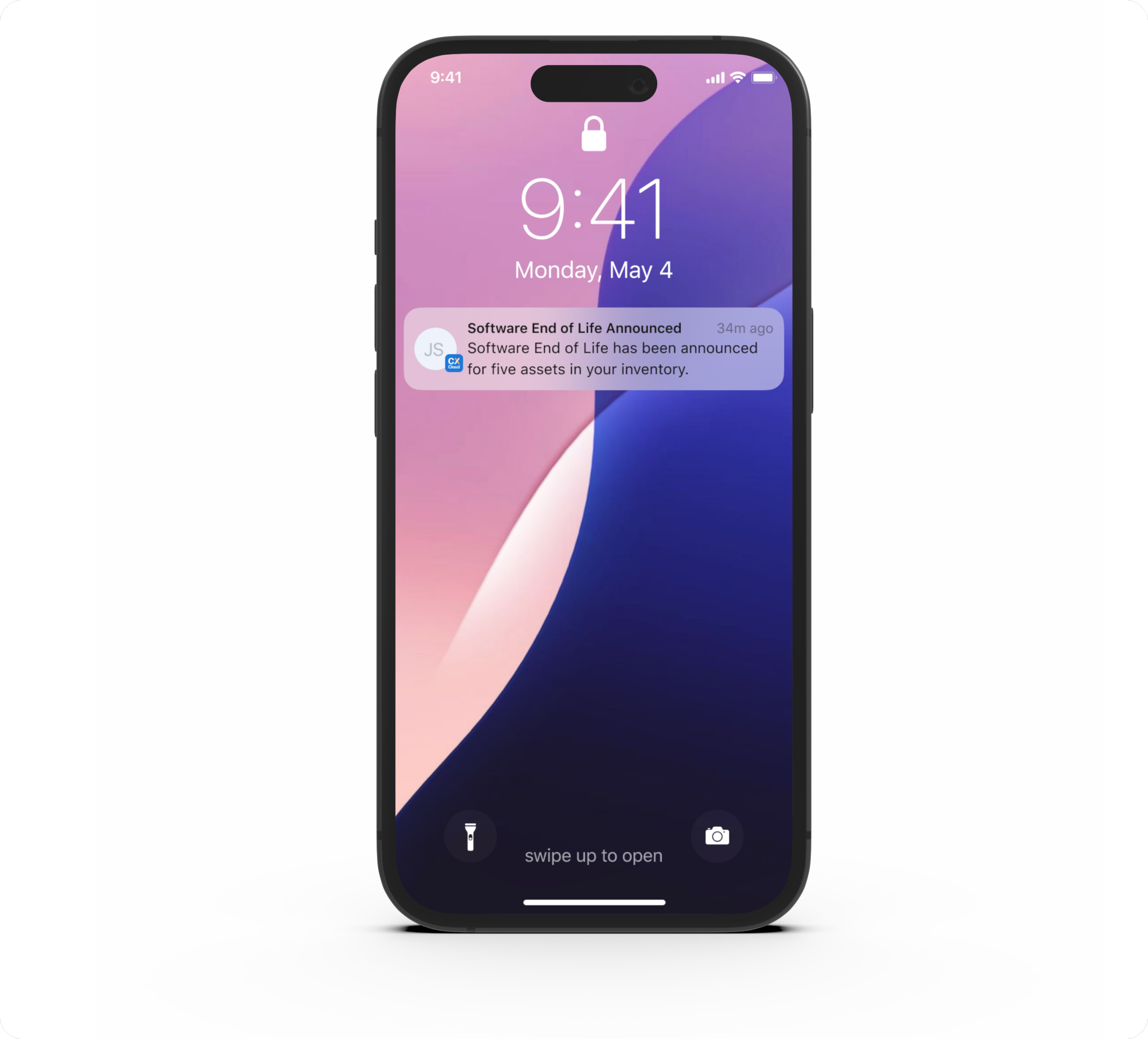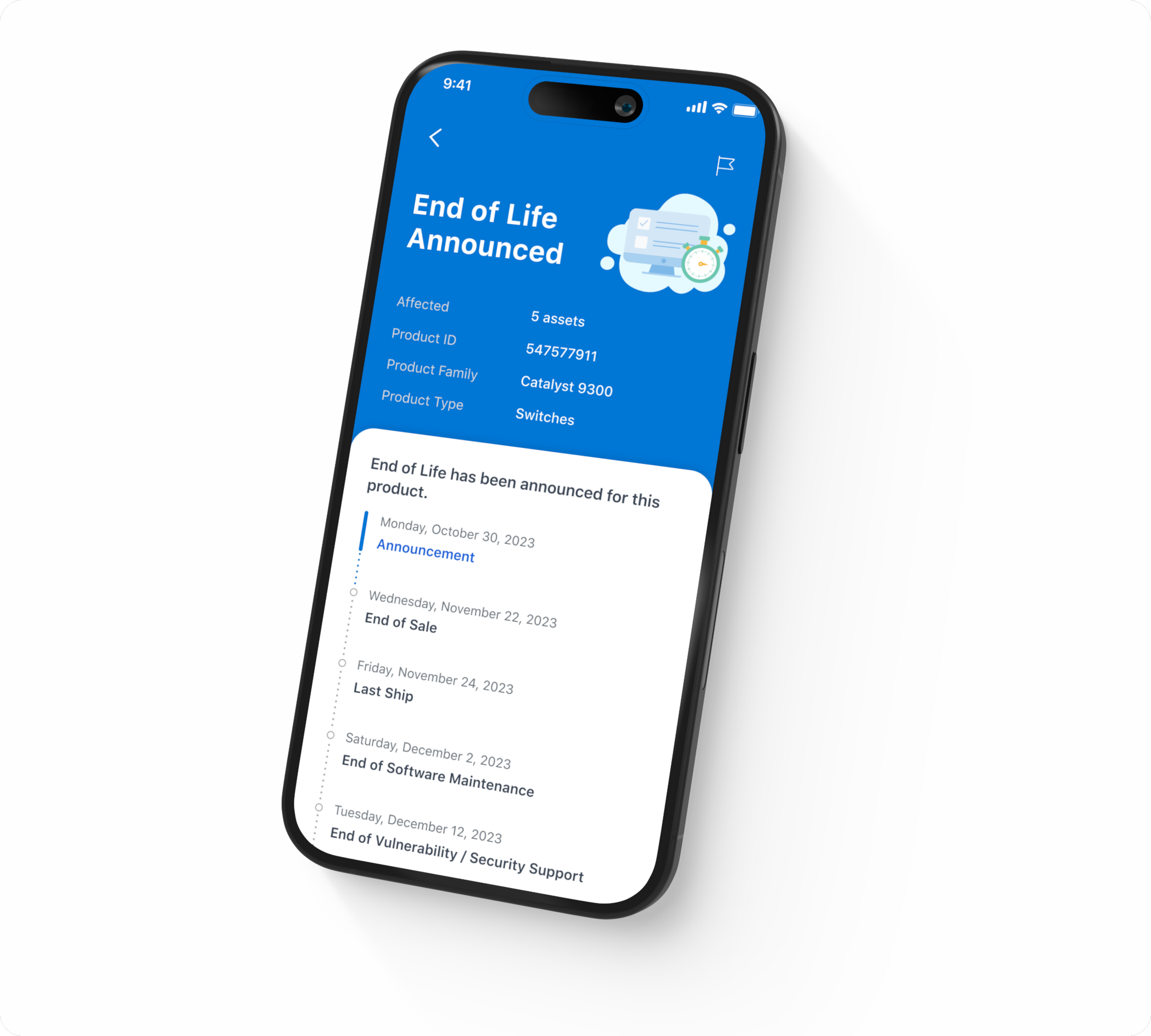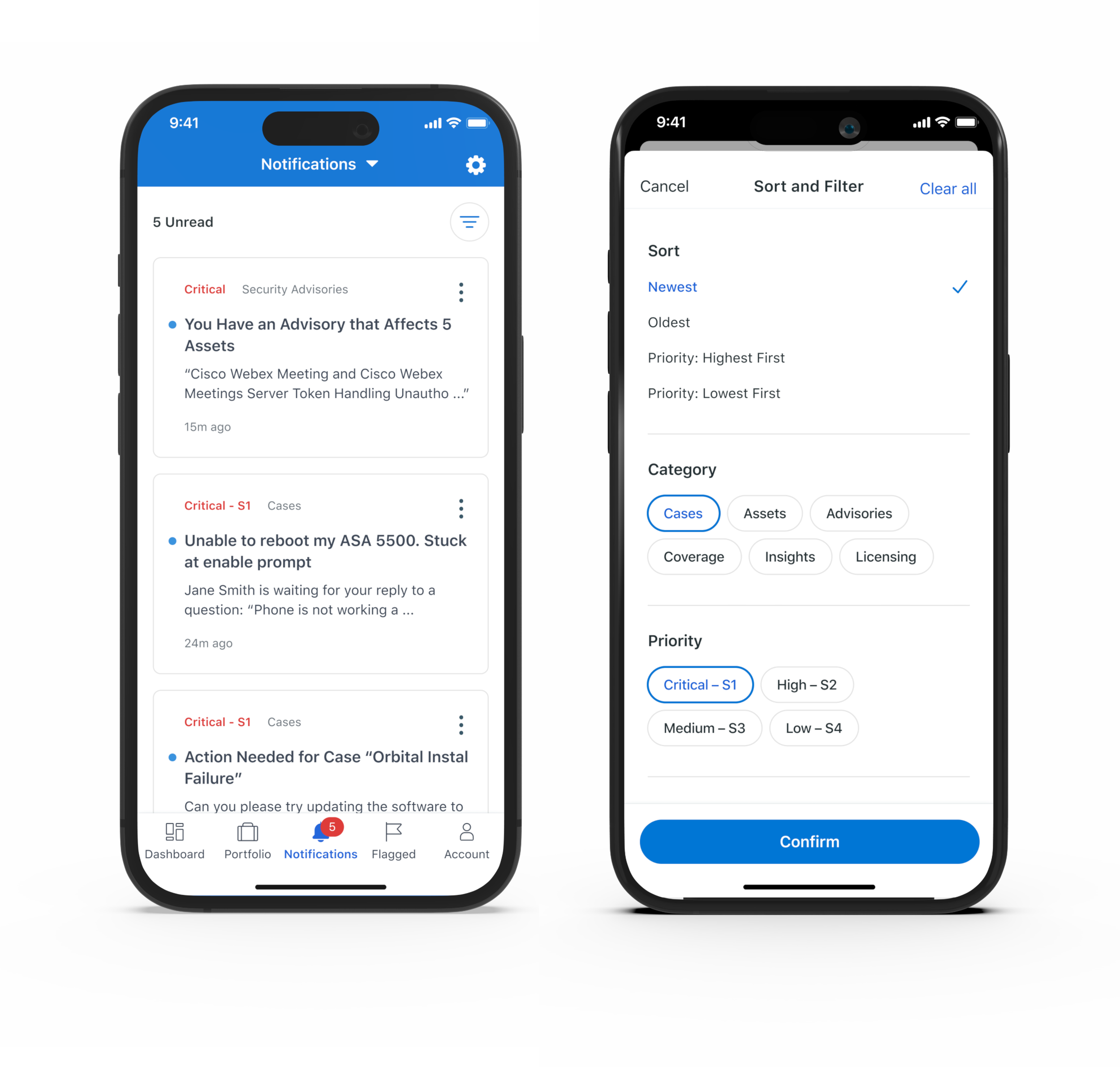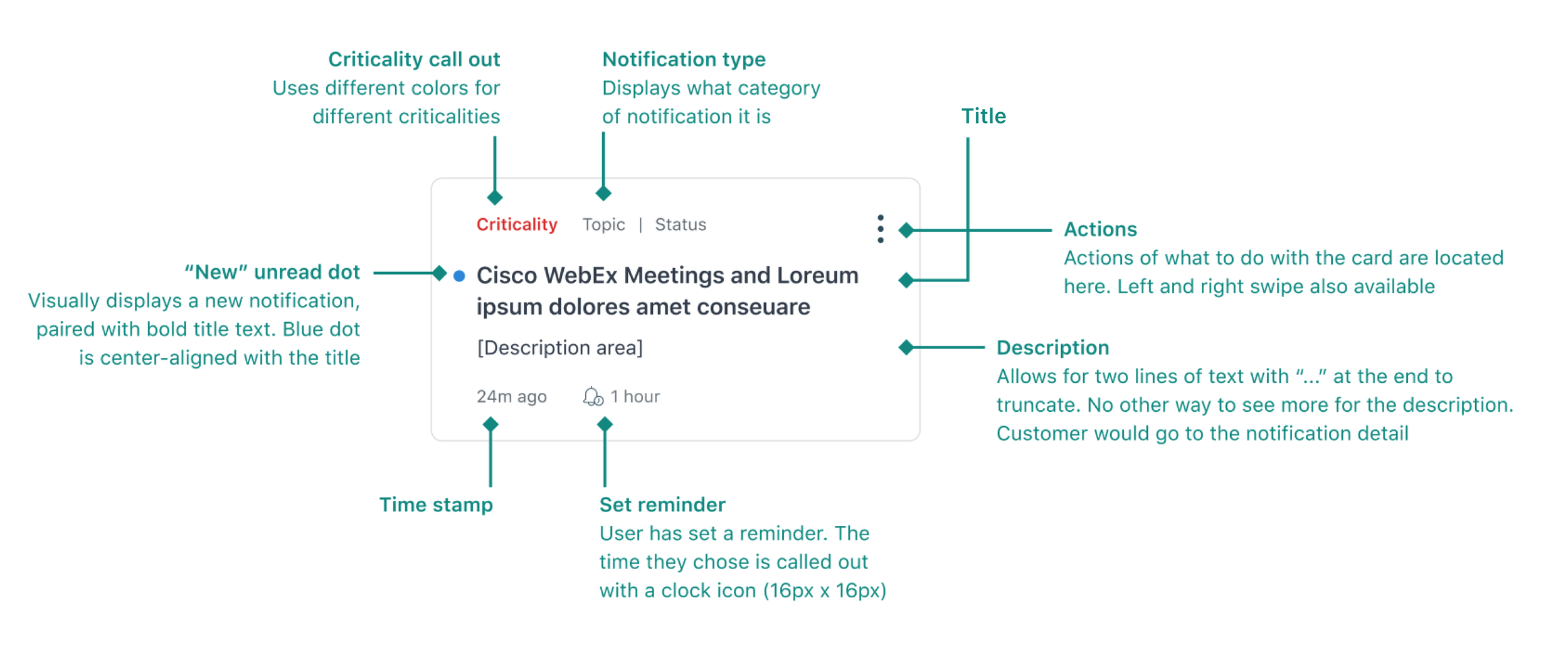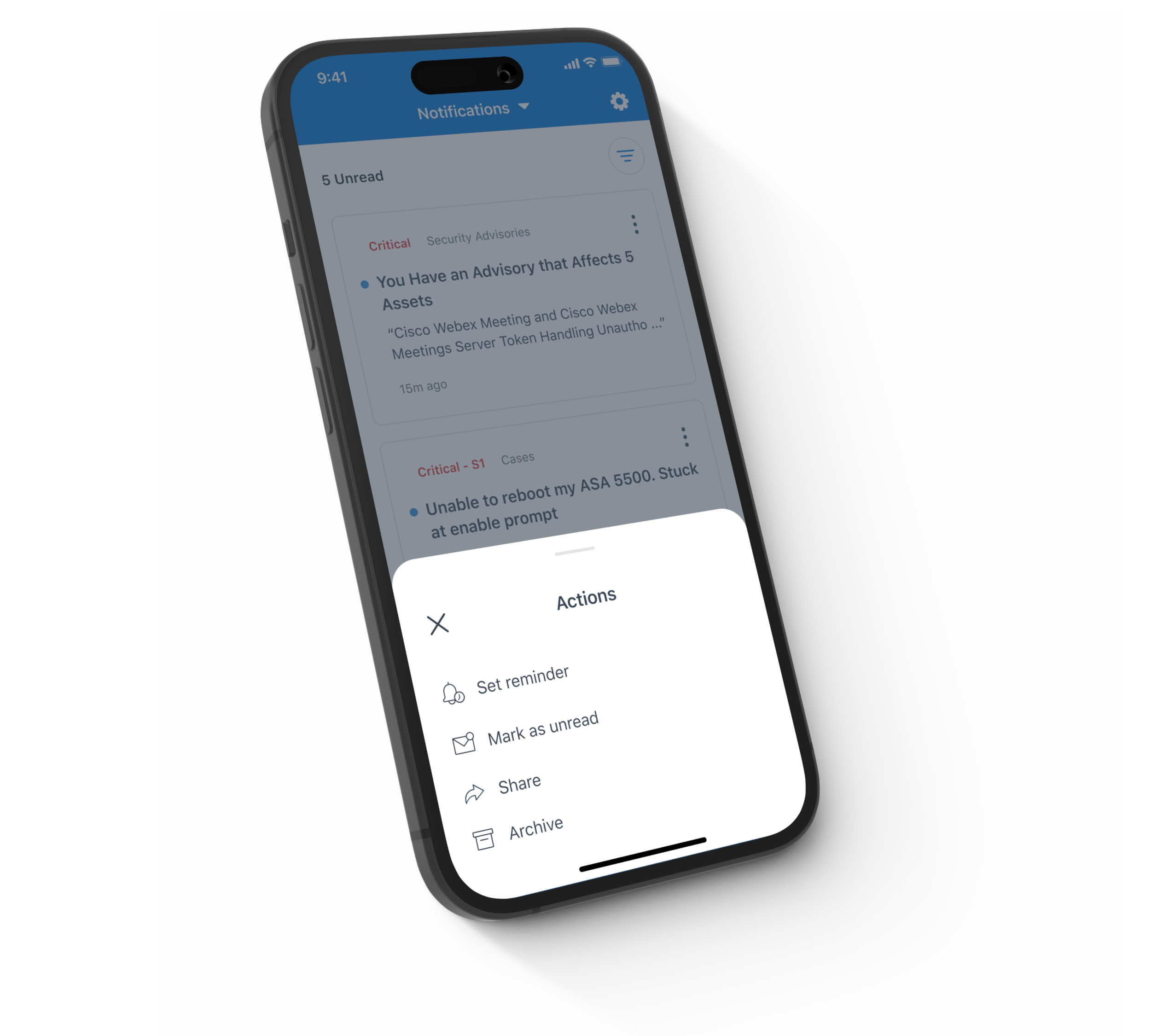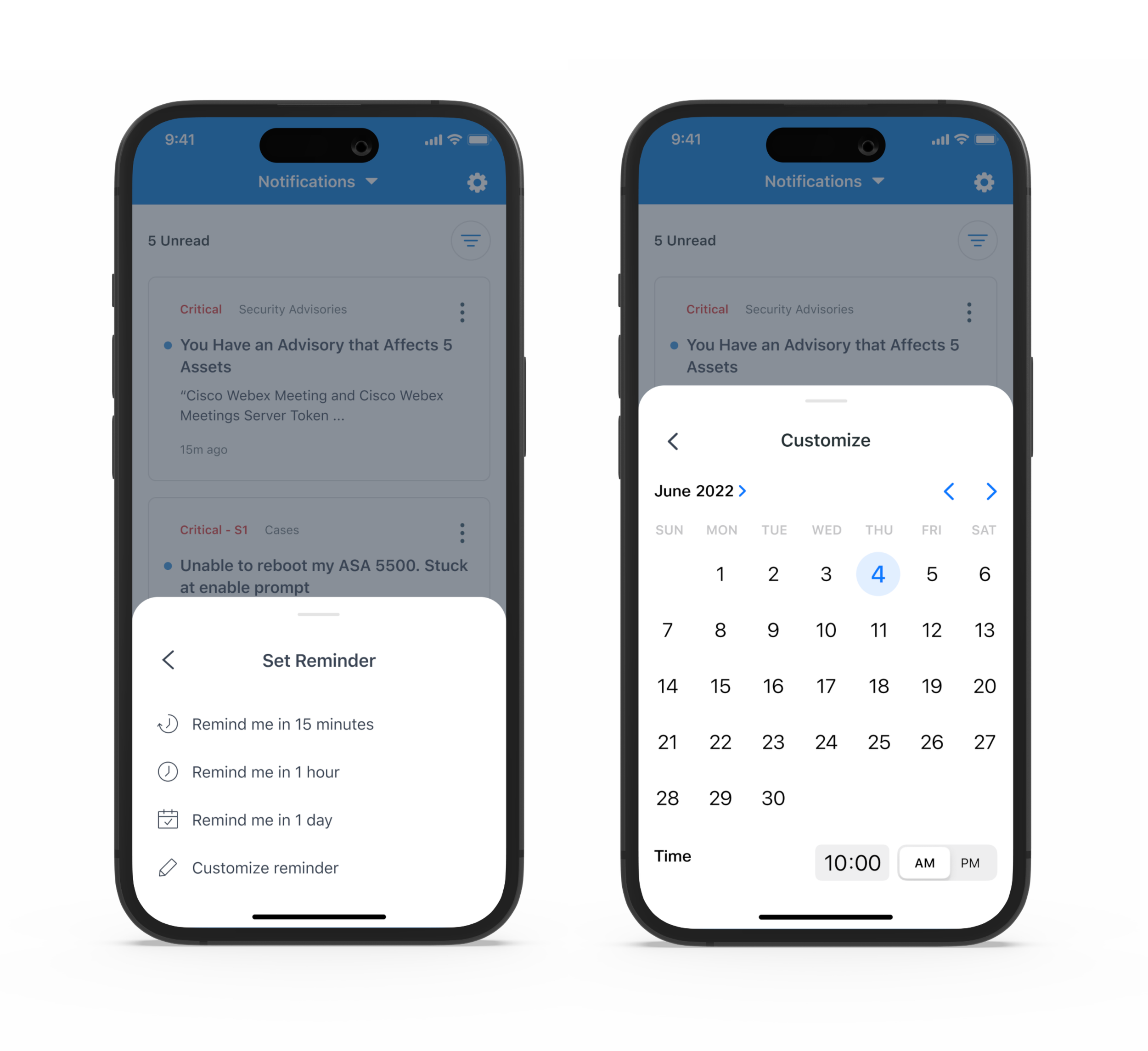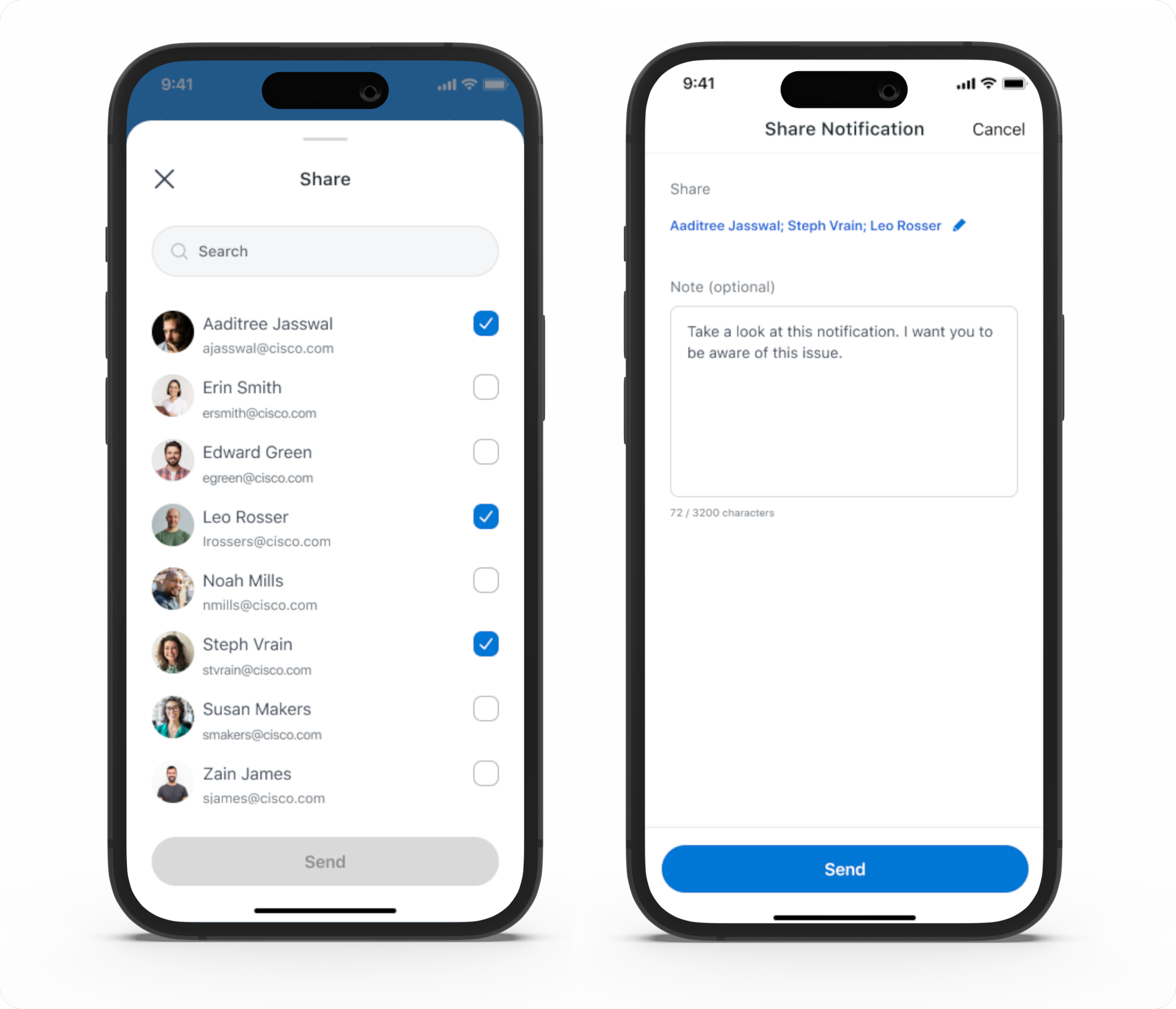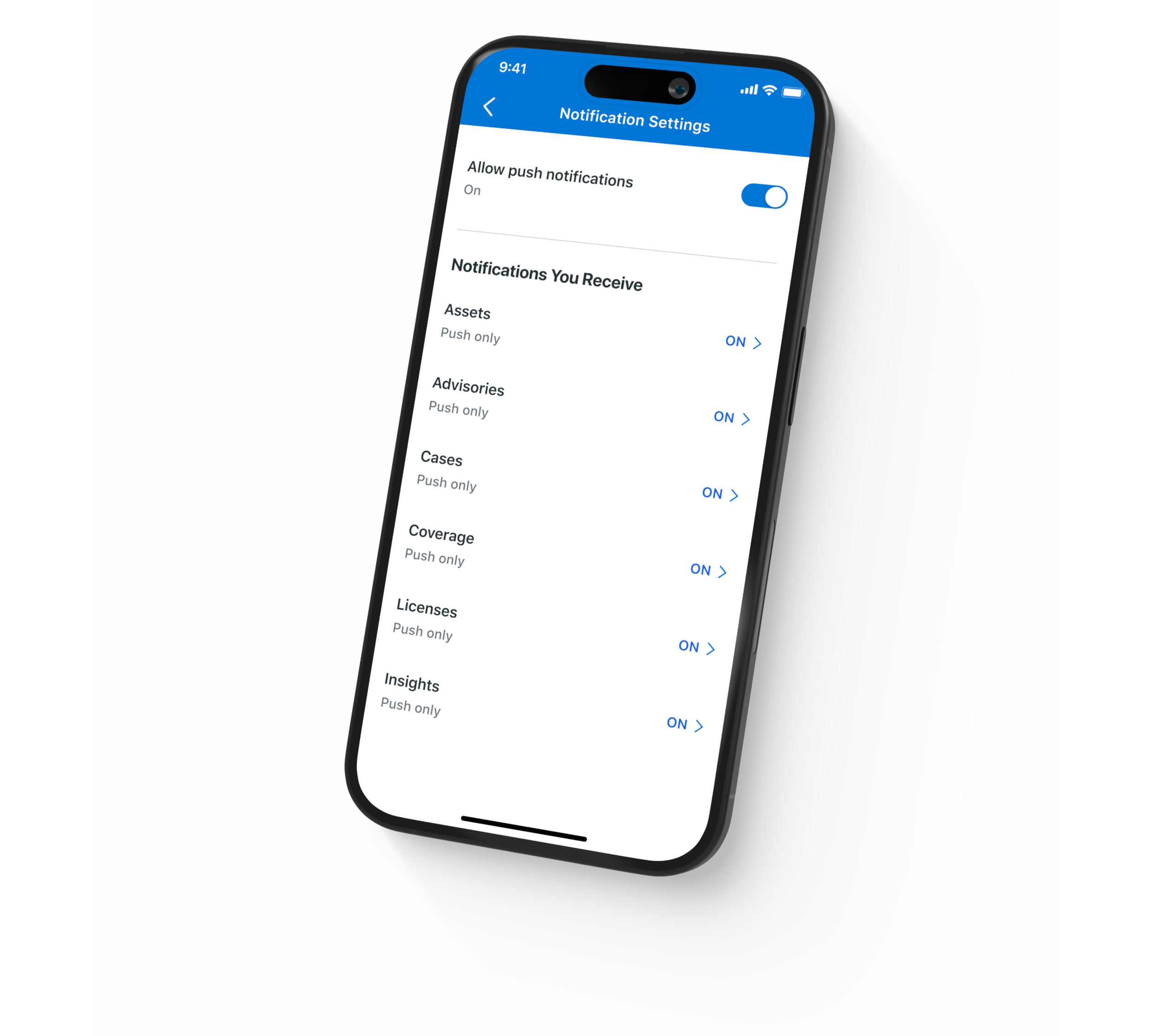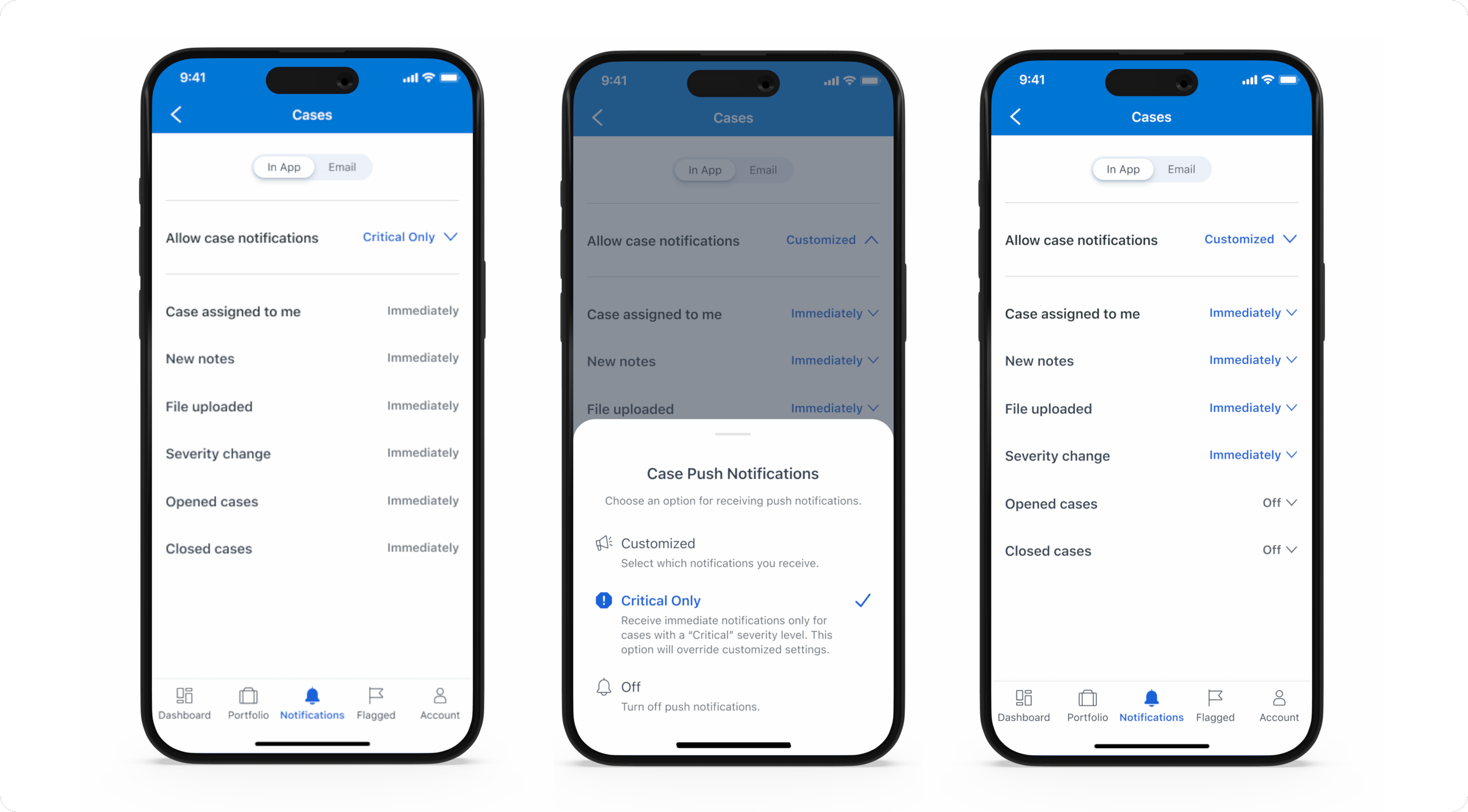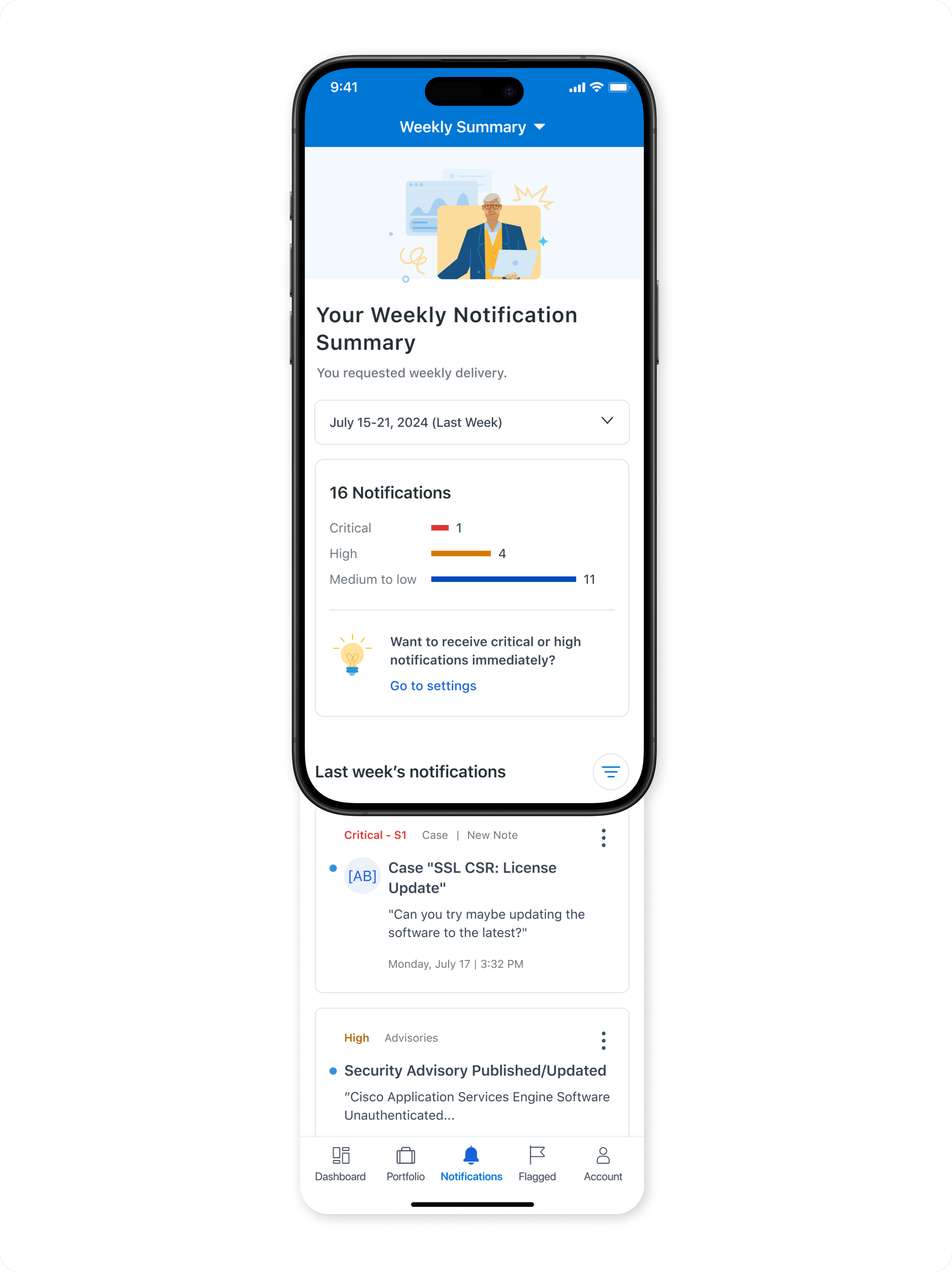Crafting the Art of Notifications
Stay informed and connected: A cross-platform notification ecosystem delivering critical alerts, all managed in one place
My Role
Leader, Product Design
Created project definition, goals, overall vision, project management, and strategy. Led cross-functional teams and a team of 3 designers
Key Stakeholders
Executive Leadership
Product & Engineering teams
The End User
Overview
CX Cloud users required an efficient way to stay informed about critical network issues in real-time, but the platform lacked a notification system. The CX Cloud Mobile App was developed to enhance user engagement by delivering timely updates. To ensure its success, notifications were identified as the top priority feature, keeping users connected and informed as issues arise.
Scope
Mobile, Desktop, and Email
Push Notifications
Notification Center
Settings
Problems
No notifications: Critical issues are going unnoticed due to the lack of a CX Cloud notification system
Lack of email strategy: Many were unrelated to users’ environments, causing frustration
Lack of personalization and targeting: The most common complaints about the old email experience
Challenges
Careful coordination and orchestration across multiple teams ensuring alignment
Work around development restrictions
Frequent shift in priorities
Lack of cohesive criticality strategy
Goals
Connection: Keep customers connected to CX Cloud by sharing important updates and sending personalized notifications
Give control: Offer customers nuanced controls to opt-in for relevant notifications
Multi-channel: Customers should receive updates on important topics on all platforms
Empathize
Meet Our Users
Operators aim to run the network smoothly by understanding and repairing issues and making quick improvements.
Planners look to enhance network stability and growth, optimize infrastructure, and assess new technologies.
Both personas faced challenges in staying informed about critical network issues, stability, and growth opportunities within the desktop experience.
Notifications would empower them to stay connected to their environment while on the go, allowing them to address key tasks even when away from their computer. This solution would foster a sense of accomplishment and enable them to act proactively, reducing frustration and improving their overall experience.
Empathize & Research
Pain Points
I led a workshop at Cisco Live, Las Vegas with 300+ customers to learn more about their pain points and frustrations with the current email strategy.
Initial Takaways
Research
Actionable Notifications
I worked closely with the research team to discover which notifications mattered most to our users. The findings helped me understand how our users would interact with the product in their daily lives.
Research
Flexibility & Customization
Users wanted to customize their notification experience by selecting topics of interest, preferred channels, and desired frequency of notifications.
Research
Desired Notifications by Topic
Additional Research
Desired Notification Actions
Key Considerations
Define
Requirements
Strategy
Notification Mapping
In collaboration with the research team, I identified key events that required notifications and their significance. I compiled a list of notifications, categorized by type, and prioritized them based on user data.
Strategy
Understanding the Journey
Partnering with the research team, I developed a customer journey map to understand the full user experience and connect it to the Notification Mapping process.
Strategy
Applying Notification Opportunities
Using the Notification Mapping, I identified opportunities for notifications at key points in the journey, emphasizing the importance of each use case.
Strategy
Prioritization Matrix
I created a priority matrix to analyze notification opportunities, categorizing them by type, behavior, and importance.
Strategy
MVP Prioritization
Using a prioritization matrix, I created a targeted list of essential notifications. By reviewing research findings, I developed a ranked, data-driven priority list that aligned notification features closely with both the MVP app’s structure and user insights.
To account for technical constraints, I prioritized launch-ready notifications while maintaining a backlog for additional notifications. This approach allowed the design team to stay six months to a year ahead, ensuring we were well-prepared as development advanced.
Strategy
Notification Grouping
Given that Cisco had technical constraints preventing notifications to be sent out real-time, we explored ways to reduce the volume of notifications users received at once. Given the limitations, our goal was to avoid overwhelming customers with excessive notifications. To address this, we focused on combining similar notifications for a more streamlined and user-friendly experience.
Ideate
Creating & Examining User Flows
I developed wireframes to kickstart the ideation process for both high-impact and low-impact notifications, mapping out key user flows and interactions. This foundation helped visualize and refine the notification designs, addressing user needs and prioritizing features to boost engagement and streamline communication.
Ideate
Wireframes
I created wireframes to showcase the functionality of the Notification Center and Settings, establishing a solid foundation for the design phase.
Test
Prototypes
4 prototypes were put together to get additional usability feedback on the Notifications experience.
Strategy
Planning
With no predefined requirements, I developed them based on best practices, research, and data-driven user insights. After taking on the role of Product Lead, I continued shaping the overall notification strategy while also stepping into a Project Manager role, leading all aspects of organization, communication, and design execution.
The Solution
For the MVP experience, we focused on launching Asset and Advisory notifications while the re-architecture of Cases and Insights was still in progress.
Desktop & Mobile Parity
Customers expressed a preference for receiving consistent notifications across multiple channels. This real-time synchronization allows them to seamlessly transition between personal time and work hours.
Email templates
Research found that better personalization and targeting would improve the email experience. The new notification system implemented emails that allowed users to opt in to receive them, causing less redundancy and more personalization.
Clear messaging
Push notifications were designed with clear and concise messaging, enabling users to quickly assess the information and decide whether immediate action is needed.
Notification Detail Experience
When users tap on a push notification, they are directed to a detailed Notification page. Through a “How Might We” exercise, the team explored individual versus grouped notifications. To reduce notification fatigue, we grouped similar notifications, offering users a bird’s-eye view of issues that share common characteristics, such as similar End-of-Life (EOL) dates.
Personalized Hierarchy
Users can establish their own notification hierarchy by sorting and filtering notifications based on urgency. Options include sorting by time received or priority, and filtering by category, priority, and read/unread status. This helps users quickly navigate the Notification Center, making it more efficient for on-the-go use.
Due to backend limitations with Cases, we prioritized Asset and Advisory notifications. Notably, 82% of customers value asset notifications.
Notification Center Card Layout
Designed to deliver clear, simple, and direct messaging to the user.
Notification Center with Actions
It was proven users wanted the ability to take action on a notification. Set reminder and Share were two of the biggest requests.
Set Reminder
Users highly valued the ability to set reminders for notifications, allowing them to snooze a notification until a later time.
Quick options for both default and customized timelines save time and improve user experience.
Share Notification
Users can share notifications with colleagues, a highly requested feature that facilitates teamwork and issue resolution.
Organized by Topic
Our redesigned Notification Settings deliver the desired granularity, enabling users to manage exactly which notifications they receive and when, down to each specific category.
Personalized Settings
Personalized settings gives the user the ability to quickly choose to receive Critical Only notifications vs Customized offers a personalized experience that can flex to accommodate user needs.
The most important settings features are (1) Criticality (2) Frequency (3) Channel: mobile push, email, desktop push
Weekly Summary
The Weekly Summary feature is customizable, allowing users to choose how often they want to be notified about specific topics and set urgency levels. This feature reduces inbox overload by consolidating non-urgent information into a single, digestible summary. With 80% of users preferring a summary for non-urgent content, it helps reduce the overall number of notifications.
Users also retain the option to opt into email notifications at their discretion.


